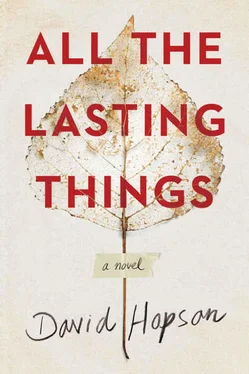“Is this it?” she said, placing a reverent hand on it.
“This is it.”
“And you’re almost done?”
“I’m working on the transitions between acts.”
“We should leave you alone then.”
“No.” He grabbed her sleeve as she turned to leave and asked her to sit down. “I could use a break.”
Claudia took a seat on the couch, considering the hieroglyphics on the pages Max had left with her. “I always wished I’d learned how to read music.”
“It’s not too late. I could teach you.”
“You have better things to do. Like working on your transitions.” She looked around the room, the ghost of her father battering away at his Olivetti, ransacking his bookshelves for the one and only epigraph that made sense.
“What’s wrong?” Max asked.
Claudia shook her head. “A little sad. My dad’s study.”
“It brings me luck to work in here.” Max collected the sheets from her and, adding them to his half of the score, tapped the edges into one neat sheaf, which he carefully laid on Henry’s desk. “He wrote eight books in here. At this desk. I figure if I can pick up a little of that magic.”
“Don’t let him hear you say that.” A look of sorrow landed on her face, which she quickly shooed away, half amused, as if to say it didn’t matter now what Henry heard. “He always said writing was work. Not magic. He hated when other writers said they were channeling voices from another realm. He said writing had more in common with ditch digging than sitting around like a clairvoyant waiting for Aunt Gladys to tell you a story. You show up every day and you work.”
“He’s right. But there’s always a little magic, I think.”
“And it’s not eight books. It’s nine.”
“ Nuisance, Open Ground, The Skirmishes, Nostomania —that’s my favorite.” Max ticked off the titles he’d read since last September on his fingers. Five. Six. Seven. “I’m forgetting the essays.”
“ Imponderable Needs .”
“Right. Eight.”
“See that safe right behind you? That’s nine.”
“What is it?”
“I don’t know. No one’s read it. Except my uncle Roger, and he has reservations about publishing it.”
“Why? Isn’t it any good?”
“Roger says it’s his best. But he thinks publishing it could be — messy.”
“What does that mean?”
Claudia shrugged. “He won’t say.”
“And you haven’t read it?”
“Nope.”
Max turned to look at the safe. “He keeps it in there?”
“He’s never written on a computer.”
“I get that,” Max said.
“I don’t,” Claudia answered. “It’s dumb.”
They went downstairs, and two hours later, after three neat pours of bourbon (after which, Claudia, with an uneasy sense of parental duty, cut him off), he returned. The room, with all its lamps burning, seemed violently lit. He turned off all but the task lamp on Henry’s desk. It threw barely enough light to see by, but Max wasn’t deterred from taking a slow, bobbing stroll around the room. Swaying lightly, he studied the spines of Henry’s books, pulled one volume and then another from the tightly packed shelves. His fingers found the collection of Henry’s awards, feeling them like a blind man, trailing over the smooth etched crystal, the cool etched bronze. He examined the trinkets that had little value, he supposed, to anyone but Henry — and now that Henry had forgotten them? What was the worth of this toy soldier? Of that heavy brass urn and whatever was inside it? Sooner or later it would all be swept away. Everything, everything goes. Finally, he came to sit at Henry’s tank of a desk, a large gray metal antique with silver-handled drawers buffed by a thousand openings. Max peeked into these, disappointed to find a pack of unopened cigarettes and a box of large wooden matches, dusty manila folders stuffed with ancient contracts, a faded photo of Benji and Claudia, thrilled and frightened, being locked in the shiny red seat of a Ferris wheel.
He spun round in the chair. He spun round and round like a game show wheel, not knowing where he’d land. As the room slowed, the objects in it separated from the smear that speed and drink had made of them. Here was the desk lamp. The couch. The fancy flat-screen computer shagged like a bulletin board with taped notes and newspaper clippings. The score. The safe sitting atop a waist-high bookcase. When he stopped, his eyes were level with the squat cube of black metal with a combination lock fitted into its hefty handle. He rapped his knuckles on the top, waiting, as if something inside might rap back, then tested the door. It swung open heavily on its hinges. Max looked around like an amateur thief who expects the hand of the law to clamp down on him. He angled the desk lamp so he could see the fat stack of typed pages tied with a length of butcher’s twine inside. The last book. The messy one. The only copy of whatever it was in the world. With care, Max removed the bundle and placed it on the desk. He slipped the knot from the string and, boosted by a vaguely stimulating sense of criminality, started to read.
The title page: EVERY WAND’RING BARK.
Max wasn’t 100 percent sure he liked that, but he turned the page and read what followed: I am minutes away from meeting the woman I think I’ll be with for the rest of my life and years and years away from the one who will make the rest of my life livable.
In the morning, he woke to an old analog clock whose face glowed green. He sat humped in the chair. Stiff neck. Sore back. Head throbbing from three belts of Blanton’s. The pages of Henry’s book lay in a chaotic nest around his feet. What had he read? The realization hurt his head as much as the bourbon. He gathered the papers on the floor, determined to return them to the right order later, and stuffed the rumpled pile back into the safe, afraid he’d be caught and made to lock it away before he could return to it.
It was six o’clock. Soon Evelyn would rouse the troops with coffee and eggs. Max felt, in that moment, as if his legs had been swept out from under him, a churn of emotions pulling him out to sea, an unwanted knowledge threatening to take him under. What had Henry been thinking? And Evelyn? And was it true? His heart ached for them and for the ghost of the woman who had always stood between them and, most of all, for Claudia, who hadn’t a clue that her mother had wandered into the woods so long ago and ended herself in a pile of snow. He felt love for his grandparents and their attempt to weave a web to protect their daughter as much as he felt contempt for their duplicity. How could they do it? How could they think they’d get away with it? And they were getting away with it were it not for the four-hundred-page confession Henry planned on dropping only after he’d escaped from the fallout. They were saints, sparing Claudia the cross of a painful secret, and they were cowards, protecting themselves for keeping it.
The question was: now that Max knew, what would he do? To continue to hide the secret from Claudia was, in effect, to relegate her to the same realm of ignorance from which he himself had fought to break free. Sure, she was blissfully ignorant of her ignorance, but did that excuse confining her to the dark? Wouldn’t she want to know her place, her origin? She was strong: if he exposed to her the cracks in her foundation, who better than she to fix them? Then again, what if he brought the entire house down? His mind slowed at this thought as if he’d drilled past all the dirt and muck and finally hit bedrock. Did he want to bring her house down? If his immediate impulse was to rescue Claudia from a lifelong lie, to deliver her closer to the truth of her own story, he had to admit that beneath this lay the obdurate wish to see her suffer as he had. Tit for motherfucking tat.
Читать дальше












